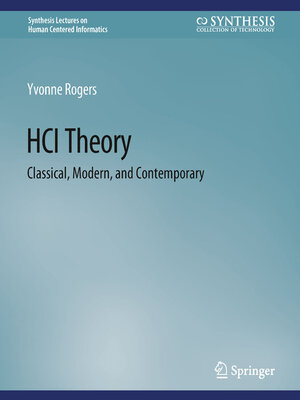HCI Theory
ebook ∣ Classical, Modern, and Contemporary · Synthesis Lectures on Human-Centered Informatics
By Yvonne Rogers

Sign up to save your library
With an OverDrive account, you can save your favorite libraries for at-a-glance information about availability. Find out more about OverDrive accounts.
Find this title in Libby, the library reading app by OverDrive.



Search for a digital library with this title
Title found at these libraries:
| Library Name | Distance |
|---|---|
| Loading... |
Theory is the bedrock of many sciences, providing a rigorous method to advance knowledge, through testing and falsifying hypotheses about observable phenomena. To begin with, the nascent field of HCI followed the scientific method borrowing theories from cognitive science to test theories about user performance at the interface. But HCI has emerged as an eclectic interdiscipline rather than a well-defined science. It now covers all aspects of human life, from birth to bereavement, through all manner of computing, from device ecologies to nano-technology. It comes as no surprise that the role of theory in HCI has also greatly expanded from the early days of scientific testing to include other functions such as describing, explaining, critiquing, and as the basis for generating new designs. The book charts the theoretical developments in HCI, both past and present, reflecting on how they have shaped the field. It explores both the rhetoric and the reality: how theories have been conceptualized, what was promised, how they have been used and which has made the most impact in the field — and the reasons for this. Finally, it looks to the future and asks whether theory will continue to have a role, and, if so, what this might be. Table of Contents: Introduction / The Backdrop to HCI Theory / The Role and Contribution of Theory in HCI / Classical Theories / Modern Theories / Contemporary Theory / Discussion / Summary







